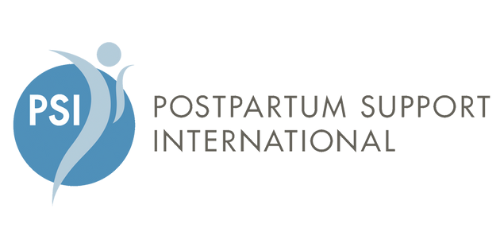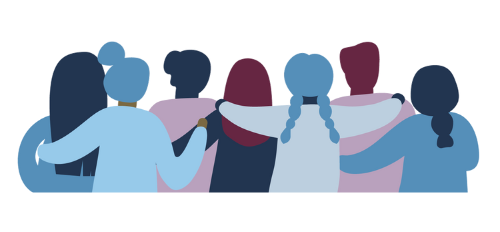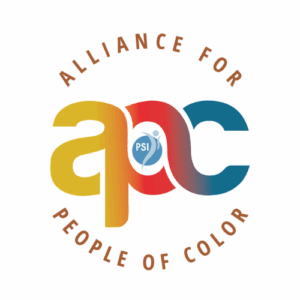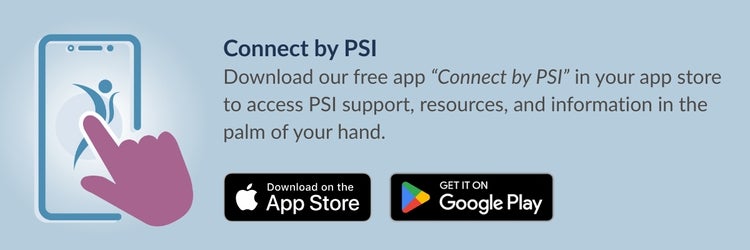
By Nurture Connection
Cody Alvey, MS, CLE, PMH-C, executive assistant for Postpartum Support International (PSI), was staffing a perinatal mental health information table at a health fair in Kentucky. And she was really enjoying it, thanks to a sunny, upbeat mom volunteering with her, who provided an interesting stream of chatter throughout the day. As they were packing up after the fair, Alvey told the volunteer how nice it was meeting her. The volunteer turned to her and said, “I talked a lot today. But I guess what I really should have said is that I wanted to volunteer because I wouldn’t even be alive if I hadn’t connected with my [perinatal mental health certified] therapist.”
For Alvey, this mother’s comment was yet another proof point that parents need to make personal connections before they can talk honestly about their perinatal mental health challenges. Interactions like this illustrate why PSI’s relational approach to program design and services is so critical. “There’s still stigma, you know, around mental health, especially for parents,” says Alvey. “She had to talk to me for three and a half hours before she could say that — that’s really the key piece for all of us to think about.”
Promoting Relational Health to Improve Mental Health
“The rates of death by suicide during pregnancy and postpartum are shockingly high. Parents feel isolated, think they’re failing, and are afraid to reach out,” explains PSI President and CEO Wendy Davis, PhD, PMH-C.
Parents in particular are hesitant to ask for help because they often feel doubly judged: that they’re struggling with mental health and that they’re not “happy” during and after pregnancy, which is supposed to be a joyful time. When parents feel depressed or anxious, they often assume something is wrong with them and that they’re not meant to be a parent.
“I did not tell my most trusted, beloved midwife or pediatrician that I was having insomnia, suicidal thoughts, was depressed, and couldn’t eat,” recalls Davis. Fortunately, most perinatal mood disorders are treatable, and with help and early intervention, people get better. Knowing how common, treatable — and blameless — perinatal mental health disorders are “can save lives,” says Davis. “I’m not overstating that.”
In fact, the Centers for Disease Control and Prevention (CDC) reports that 84 percent of pregnancy-related deaths are preventable. But research also shows that 75 percent of women affected by mental health conditions one year postpartum do not receive treatment.
Promoting relational health to improve mental health through prevention and healing is where Postpartum Support International plugs in. PSI was established in 1987 and works to promote awareness, prevention, and treatment of mental health issues related to childbearing in every country worldwide. It serves as a bridge to mental health support and resources for pregnant and postpartum parents, including providing peer support groups, peer mentors, 24/7 helplines, and the National Maternal Mental Health Hotline, in addition to a perinatal mental health (PMH) provider directory and other services.
“We like to think of ourselves as a hub — a connection point — for support during the perinatal period of mental health,” says PSI Deputy CEO Andrea Clark, JD, MDiv.
How Common Are Perinatal Mental Health Challenges?
Perinatal mental health challenges are not just depression. Not just postpartum. And not just moms.
- The CDC reports that 84 percent of pregnancy-related deaths are preventable.
- One in five mothers experiences serious depression or anxiety during pregnancy or postpartum.
- At least 1 in 10 fathers experiences postpartum depression (PPD).
- Seventy-five percent of women affected by mental health conditions one year postpartum do not receive treatment.
“What we have found is that the individuals who are dealing with depression, anxiety,
and other mental health disorders are often very attached to their infants.”
—Cody Alvey, MS, CLE, PMH-C, executive assistant for Postpartum Support International (PSI)

Breaking Down Silos: ERH and Perinatal Mental Health
Without caring for the mental health of the parent, Early Relational Health (ERH) between the parent and child can’t flourish. “For ERH to happen, first we need to address, assess, and get treatment and support for parental mental health,” explains Davis.
Universal screening for the risk of perinatal mental health disorders in new and expectant parents is recommended by many professional societies, including the American College of Obstetricians and Gynecologists (ACOG), American Academy of Pediatrics (AAP), American Academy of Family Physicians (AAFP), and American College of Nurse-Midwives (ACNM).
However, clinicians and midwives in OB settings typically see patients only until six weeks postpartum. Perinatal mood disorders can start any time during pregnancy, including after loss or termination, and last through the first year postpartum. That makes it critical for providers in the primary care and pediatric health settings, and other organizations who may be providing social needs, supports, or other services to families, to continue to follow up with parents.
PSI recommends multiple parent mental health screenings during the first year:
- First prenatal visit, whenever it occurs
- At least once in second trimester
- At least once in third trimester
- Six-week postpartum obstetrical visit (or at first postpartum visit)
- Repeated screening at 6 and/or 12 months in OB and primary care settings
- One-, two-, four-, and six-month pediatric visits
“I still remember an important piece of information from pediatrician R. J. Gillespie [of the Children’s Clinic in Portland, Oregon],” recalls Davis. “He said when you started adding screening at 12 months, your rates of detection went up. And also, when you added ‘Did you really honestly answer these questions?’ [to the screening questions] your rates of detection went up.”
Ongoing screening is important because you can’t tell if someone is suffering by looking at them. “What we have found is that the individuals who are dealing with depression, anxiety, and other mental health disorders are often very attached to their infants, which goes against what you might assume,” Davis shares. “They are emotionally attached, but it’s hard for them to act on their feelings. For example, I was caring for my child, but I wasn’t feeling or seeing the ways in which I was bonding with him.”
The Power of Peer Support
“Peer support isn’t just an add-on or something for people to do while they’re waiting for treatment,” says Davis. “Peer support is part of treatment and recovery and actually is an extensive referral and resource system.”
The team describes PSI as a clearinghouse for this relationship-based referral and resource system and emphasizes how important it is to integrate peer support into healthcare settings. Also, PSI recommends providing services for the whole family, not just the birthing person, because during this time there can be significant emotional and relational changes in the broader “support unit.”
“We look to wrap services around not just the birthing person but also their family and the other folks who are their supports,” says Clark. Examples include PSI support groups for dads, grandparents, relationship therapy, and adults supporting teen parents.
Connecting with other parents who have had similar experiences normalizes mental health challenges and lets parents know they’re not alone. With PSI, parents can do this in multiple ways: through online peer support groups, peer mentors (one-to-one support), and local navigators/support volunteers. There are PSI volunteers in every state and about 40 other countries, providing support in English, Spanish, and many other languages.
Fostering diverse peer support is critical for increasing reach. “We come from a position — as Nurture Connection does — of thinking about developing communities of care and cultural relevance to improve access and for prevention, referral, and follow-up,” says Davis. “We lean into equity, inclusivity, diversity, and access.”
There are nearly 50 different free online PSI peer support groups for people to connect, such as for Asian, Pacific Islander, and Desi moms; bipolar support; birth trauma support for BIPOC birthing people; dads; military moms; Latinx; queer and trans parents; and substance use recovery.
PSI also launched the Alliance for People of Color. The aim of the Alliance is to provide public education about how perinatal mood disorders affect people of color differently, to bring awareness to perinatal mood disorders in communities of color, and also to support professionals of color, connect members to share best practices, and help to build the career pipeline.

Perinatal Mental Health Promotes ERH
Supporting parents’ perinatal mental health gives professionals in the ERH field additional ways to promote healthy parent-child relationships. PSI isn’t just a hub for parents and therapists — the organization serves professionals from across disciplines who work with families and birthing people.
Thanks to a strong network of volunteers, PSI and the professionals who work with PSI benefit from the input of individuals with lived experience and expertise. “Many people who have sought help from PSI come back and volunteer, work here, and come to our conferences,” says Davis. “Coming full circle seems to continue the healing process for former help seekers as they help others. Their contributions and drive to give back keep all of us learning and feeling rewarded in this work.”
For more information about PSI’s services, trainings, and perinatal mental health, visit postpartum.net. For details about PSI’s policy arm and how it’s working to make perinatal mental health a national priority, sign up for the Mind the Gap newsletter.
How to Contact PSI
People in crisis should call their local emergency number or the Suicide & Crisis Lifeline at 988.
1-800-944-4773
Text “help” to 800-944-4773
Text en Español: 971-203-7773
PSI HelpLine does not handle emergencies.
- Leave a message, text, or fill out an online form to receive support in 1 to 2 days.
- English and Spanish
- International
National Maternal Mental Health Hotline
1-833-TLC-MAMA
- U.S. only
- Talk to a trained counselor 24/7
- 60 languages
Connect by PSI app
- Free to download
- Access PSI support, resources, and information
This blog post is part of Nurture Connection’s “ERH in Action” series of listening and learning sessions. Our network is full of meaningful examples of people and organizations promoting ERH in their daily lives and work. Our “ERH in Action” series highlights and uplifts stories from various fields to share learnings, challenges, and bright spots in the movement.
